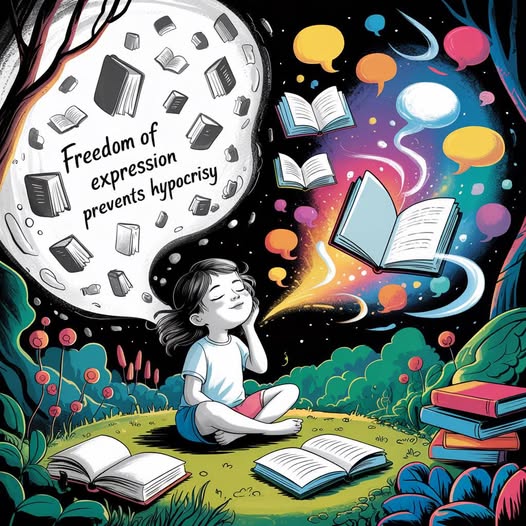
It was a bright, breezy afternoon. The little girl and her grandfather sat under their favorite oak tree, the one whose thick branches seemed to hold up the sky itself.
The little girl twirled a blade of grass between her fingers and asked,
“Grandpa, what is freedom, anyway? what does it really mean to be free? Is it just about doing whatever you want?”
The grandfather smiled and tapped his walking stick lightly against the earth.
“Ah, my dear,” he said, “freedom is much deeper than simply doing as you please. It’s the air that allows your soul to breathe.”
He leaned back against the tree, letting the wind ruffle his silver hair.
“You see,” he said, “freedom means having space — space to think, to speak, to grow, and to make choices. Without it, people are not truly alive; they are just surviving, like birds in a cage.”
The little girl listened, her eyes wide.
“But,” he continued, “freedom isn’t just about running in the fields or choosing what to eat. There’s something even more important — the freedom to express what you think.”
He bent forward, speaking gently,
“Human beings are thinking creatures. Even if you silence their mouths, you cannot silence their minds. If people are not allowed to speak their thoughts, their words hide in their hearts like trapped birds. This breeds fear. Worse, it breeds hypocrisy.”
She frowned. “What’s hypocrisy, Grandpa?”
He smiled sadly.
“It’s when people pretend to believe something they don’t, just to stay safe. In a land where people cannot express themselves, everyone smiles on the outside but is wounded on the inside. Sincerity disappears. Only masks remain.”
He looked out across the fields, the sun warming his face.
“A nation without freedom of expression becomes a garden where no real flowers grow — only painted ones.”
The little girl plucked a small daisy and held it up.
“Real flowers are better,” she said.
“Yes,” he nodded. “Real words are better, too. When people are free to speak, they will criticize each other sometimes — and that’s a good thing! Criticism is not poison; it’s sunlight for the mind. Without it, thinking withers. Without it, nations stagnate.”
He tapped his stick again.
“In life, the choice isn’t between criticism and silence. It’s between criticism and decay. If you end criticism, you end the very mind of humanity.”
The little girl thought hard.
“So even when people say things we don’t like, we should still let them speak?”
He smiled warmly.
“Yes, little one. Because by allowing every voice, the good ideas rise higher, the bad ones fall away, and the whole garden becomes richer. That’s how nations shine — not by silencing each other, but by listening, debating, learning.”
She hugged her knees, thinking deeply.
“And what if someone uses freedom to hurt others?” she asked softly.
The grandfather’s eyes twinkled.
“Ah, wisdom again! Freedom doesn’t mean hurting. It means being responsible with your voice, knowing that words, like seeds, can either grow flowers or thorns. True freedom dances hand-in-hand with respect.”
The little girl looked up at the big blue sky and smiled.
“I want to grow up in a place where everyone can plant flowers with their words.”
The grandfather kissed her forehead gently.
“And if you carry that dream, my dear,” he said, “then you will build the kind of world where freedom lives not just in laws, but in every heart.”
They sat quietly as the afternoon light rippled through the leaves, a free wind whispering dreams all around them.

